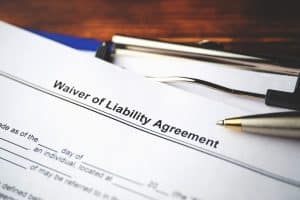When I Sign a Waiver, Does It Mean I Can’t Sue?
 In a bustling town like Memphis, it’s not unusual for residents and tourists alike to find themselves signing waivers related to recreational activities, cosmetic and medical procedures, rental services, and more. While you might assume that the act of signing a waiver completely strips you of your ability to file a lawsuit in the event of an accident, this is not always the case under Tennessee law.
In a bustling town like Memphis, it’s not unusual for residents and tourists alike to find themselves signing waivers related to recreational activities, cosmetic and medical procedures, rental services, and more. While you might assume that the act of signing a waiver completely strips you of your ability to file a lawsuit in the event of an accident, this is not always the case under Tennessee law.
Whether you’re the victim of medical malpractice, a slip and fall incident, or a motor vehicle crash, you might still be within your rights to pursue a claim for compensation – even if you signed a waiver up front. Let’s take a closer look at the role a liability waiver can play in a personal injury claim.
What is a waiver?
A waiver is a legal form that businesses or individuals may ask you to sign prior to participating in an activity that carries risk. Broadly speaking, businesses ask their customers to sign waivers acknowledging and agreeing to the risks associated with a particular activity in an attempt to absolve themselves of liability in the event of an accident. Essentially, waivers serve as written proof that a client was aware of the risks associated with participating in an activity but chose to participate anyway.
Are waivers enforceable in Tennessee?
In Tennessee, waivers can generally stand unless certain factors undermine their enforceability. In 2018, the Tennessee Supreme Court clarified the enforcement criteria for liability waivers and highlighted three key criteria for determining enforceability.
Bargaining power
If one party holds significant power or influence over the other, any waiver signed by the lesser party may be viewed as unenforceable in the eyes of the law. In practice, this might look like a customer feeling as though they have no choice but to sign a waiver due to manipulation tactics or a lack of available alternatives. For example, if a customer signs a waiver in order to use a necessary service – like public transportation or medical care – in a region where other service providers are not readily available, the court may deem the waiver unenforceable on the grounds that the customer was not truly free to decide for themselves.
Clarity of terms
Courts look closely at how a waiver is worded and presented when assessing enforceability. In order to hold up in court, a waiver must clearly outline what rights are being waived in terms that are easily understandable to the average person. If a waiver is confusing, misleading, overly broad, or missing important information or context, a judge may consider it invalid and unenforceable.
Compliance with public policy
First and foremost, state and federal law will always supersede the terms of a contract or waiver. This means a business cannot hold you to any terms of a waiver that explicitly contradict established law. That means the business cannot ask you to violate established law or shirk their own legal duty to follow all relevant legal statutes. If the terms of your waiver are in conflict with public policy, it probably will not be treated as enforceable by a court of law.
Do waivers cover all possible risks?
Most of the time, customers sign waivers acknowledging known and ordinary risks associated with certain activities and environments. Waivers do not, however, typically extend to extraordinary or undisclosed risks. For example, if you sign a waiver prior to skateboarding at a public skate park but suffer an injury due to poor floor maintenance in the bathroom, the waiver may not actually cover your injuries. Unless the waiver explicitly warned you that the floor in the bathroom was unsafe, a judge may determine that your waiver is not enforceable for injuries suffered during non-skateboard-related activities.
If you are unsure as to whether the terms of your liability waiver specifically apply in your case, it’s important to consult with an experienced attorney. Just because there was a waiver in place does not automatically mean that it covers the harm you suffered, and an attorney can help you assess whether you may still have cause to file a claim.
Other considerations for waiver enforceability
In addition to the conditions outlined above, there are some other scenarios in which a waiver may be considered unenforceable. For example, because liability waivers typically cover known and ordinary risks associated with certain activities, accidents caused by a company’s gross negligence or recklessness generally are not covered by these waivers.
Remember: Tennessee has one of the strictest statutes of limitations in the country when it comes to pursuing claims for injury-related compensation. Most accident victims only have one year to file a claim after they suffer or discover their injuries, so it’s important to move quickly after an accident to protect and preserve your rights. Even if you think you are barred from filing a claim due to the presence of a liability waiver, an experienced attorney can help you assess whether that is truly the case or if you might still have the basis for a lawsuit or insurance claim.
Final thoughts
Contrary to popular opinion, waivers are not ironclad shields that have the power to strip people of their basic legal rights or responsibilities. If a waiver contained incomplete information, violated established law, or did not cover certain extraordinary circumstances that contributed to a victim’s injuries, a Tennessee court may deem it unenforceable and allow the injured party to pursue legal action.
In many cases, the question is not whether you signed a waiver, but whether the incident involved more than you were told or reasonably knew to expect. That’s why it’s so important to partner with an experienced attorney while making determinations about how to proceed after an accident. Rather than continuing to guess or assume that a waiver applied to your injuries, it’s best to allow a legal professional to evaluate the facts of your case and determine the potential viability of your claim.
If you’ve been injured after signing a waiver, you don’t have to immediately cut your losses. Contact the experienced local team at Greer Injury Lawyers today to explore whether you may still be within your rights to pursue compensation for your accident-related losses after signing a liability waiver. Give us a call today or fill out our online contact form to request a free case evaluation, and let’s talk about how we can help you restore and protect your legal rights as you navigate your recovery process.

Since graduating magna cum laude in 2005 from the University of Memphis School of Law, Thomas has helped make a difference in the lives of victims of serious personal injury, wrongful death, and professional negligence. Thomas has extensive trial experience in both state and federal court. Among other victories in the courtroom, Thomas obtained several impressive jury verdicts and settlements
Read more about Thomas R. Greer
